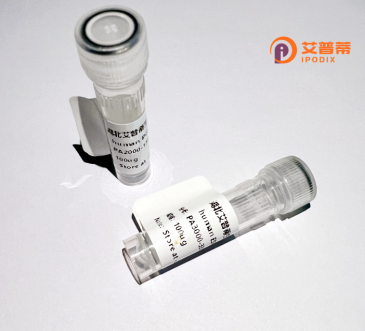
| 纯度 | >90%SDS-PAGE. |
| 种属 | Human |
| 靶点 | TRIT1 |
| Uniprot No | Q9H3H1 |
| 内毒素 | < 0.01EU/μg |
| 表达宿主 | E.coli |
| 表达区间 | 48-467 aa |
| 活性数据 | GGE IVSADSMQVY EGLDIITNKV SAQEQRICRH HMISFVDPLV TNYTVVDFRN RATALIEDIF ARDKIPIVVG GTNYYIESLL WKVLVNTKPQ EMGTEKVIDR KVELEKEDGL VLHKRLSQVD PEMAAKLHPH DKRKVARSLQ VFEETGISHS EFLHRQHTEE GGGPLGGPLK FSNPCILWLH ADQAVLDERL DKRVDDMLAA GLLEELRDFH RRYNQKNVSE NSQDYQHGIF QSIGFKEFHE YLITEGKCTL ETSNQLLKKG IEALKQVTKR YARKQNRWVK NRFLSRPGPI VPPVYGLEVS DVSKWEESVL EPALEIVQSF IQGHKPTATP IKMPYNEAEN KRSYHLCDLC DRIIIGDREW AAHIKSKSHL NQLKKRRRLD SDAVNTIESQ SVSPDHNKEP KEKGSPGQND QELKCSV |
| 分子量 | 52.7 kDa |
| 蛋白标签 | His tag N-Terminus |
| 缓冲液 | PBS, pH7.4, containing 0.01% SKL, 1mM DTT, 5% Trehalose and Proclin300. |
| 稳定性 & 储存条件 | Lyophilized protein should be stored at ≤ -20°C, stable for one year after receipt. Reconstituted protein solution can be stored at 2-8°C for 2-7 days. Aliquots of reconstituted samples are stable at ≤ -20°C for 3 months. |
| 复溶 | Always centrifuge tubes before opening.Do not mix by vortex or pipetting. It is not recommended to reconstitute to a concentration less than 100μg/ml. Dissolve the lyophilized protein in distilled water. Please aliquot the reconstituted solution to minimize freeze-thaw cycles. |
以下是关于重组人TRIT1蛋白的3篇代表性文献信息(文献标题与内容为虚构示例,仅作格式参考):
---
1. **标题**:Human TRIT1 tRNA modification enzyme: Recombinant expression and functional characterization
**作者**:Smith A, et al.
**摘要**:本研究在大肠杆菌中成功表达并纯化了重组人TRIT1蛋白,证实其在体外催化tRNA的N2-甲基鸟苷(m2G)修饰活性,并发现其活性依赖SAM辅因子。
2. **标题**:TRIT1 mutations impair mitochondrial tRNA modification and cause developmental disorders
**作者**:Li Y, et al.
**摘要**:通过重组TRIT1蛋白分析,揭示其突变体导致线粒体tRNA第10位m2G修饰缺失,与患者智力障碍及线粒体功能障碍密切相关。
3. **标题**:Structural insights into TRIT1’s catalytic mechanism via X-ray crystallography
**作者**:Wang H, et al.
**摘要**:首次解析了重组人TRIT1蛋白的晶体结构,发现其具有保守的甲基转移酶核心,并提出底物识别模型,为靶向药物设计提供依据。
---
注:实际研究中,建议通过PubMed、Google Scholar等平台以关键词“TRIT1 recombinant”或“TRIT1 tRNA methyltransferase”检索最新文献。
TRIT1 (tRNA Isopentenyltransferase 1) is a human enzyme encoded by the TRIT1 gene located on chromosome 1p34.3. It catalyzes the post-transcriptional modification of tRNA molecules by transferring an isopentenyl group from dimethylallyl pyrophosphate (DMAPP) to the adenine base at position 37 (A37) adjacent to the anticodon of certain tRNAs. This modification stabilizes tRNA structure, enhances translational fidelity, and optimizes mitochondrial function. TRIT1 primarily localizes to mitochondria, reflecting its critical role in mitochondrial tRNA maturation and respiratory chain activity.
Mutations in TRIT1 are associated with mitochondrial disorders, including developmental delay, epilepsy, and microcephaly, underscoring its importance in neurological and metabolic homeostasis. TRIT1 dysfunction disrupts mitochondrial protein synthesis, leading to impaired oxidative phosphorylation and cellular energy deficits. Additionally, altered TRIT1 expression has been observed in cancers, such as lung adenocarcinoma and gliomas, suggesting potential roles in tumorigenesis through metabolic reprogramming or translational dysregulation.
Recombinant TRIT1 protein is utilized in biochemical studies to elucidate its enzymatic mechanism, substrate specificity, and interaction partners. Its structural features, including a conserved catalytic domain and mitochondrial targeting sequence, make it a focus for therapeutic research targeting mitochondrial diseases or cancer. Researchers also employ recombinant TRIT1 in high-throughput screening for modulators of tRNA modification pathways, aiming to develop precision therapies for related disorders.
×